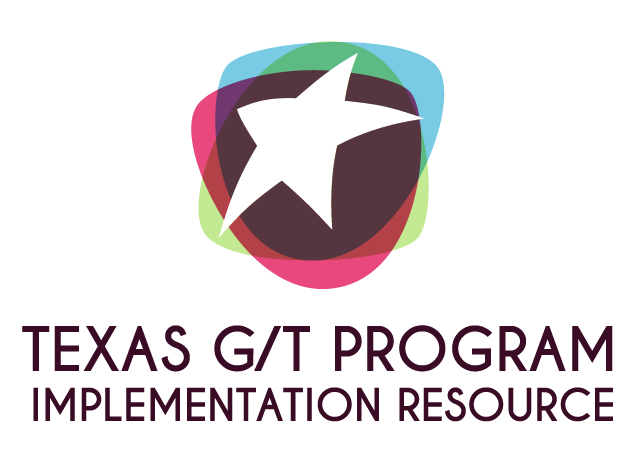Overview
The Texas Guide to Gifted/Talented (G/T) Program Implementation website provides customizable resources to assist districts in designing and implementing high-quality G/T programs. The strategies, best practices, and templates provided are aligned to meet the needs of various campus/district stakeholders, including:
- G/T Coordinators
- G/T Teachers
- Counselors
- Principals
- Superintendents
- Board of Trustees
The content is organized around and aligned to the five sections of the Texas State Plan for the Education of Gifted/Talented Students (State Plan):
- Student Assessment
- Service Design
- Curriculum and Instruction
- Professional Development
- Family/Community Involvement
The easy-to-navigate site features useful forms, free resources, and links to student assessment documents.
Please utilize the Texas G/T Program Implementation Resource to support high-quality services for G/T students, provide professional development opportunities for teachers and administrators, and reinforce collaboration among classrooms, communities, and families.
History
In 2006, the Texas Education Agency, Education Center Region 14, and 17 small school districts collaborated to develop the Small Schools Resource Guide (SSRG). The purpose of the project was to provide guidance and resources related to implementing high-quality G/T programs in districts with average daily attendance (ADA) of less than 1,500 students. This resource offered solutions related to implementation challenges experienced by many small districts, including lack of funds, personnel, and number of G/T learners within the district.
The SSRG was utilized by many teachers and administrators, including those from larger districts. As such, in 2015, the SSRG was updated and rebranded as the Texas G/T Program Implementation Resource, which provides examples and resources for all Texas districts, regardless of size.
This resource is a result of efforts by Texas Education Agency (TEA), Advanced Academic Services, Education Service Center Region 14, Advanced Placement (AP)/International Baccalaureate (IB) Projects, and an array of small school districts in Texas. Many districts with ADA of less than 1,500 have expressed numerous problems associated with development of quality services for their gifted learners. Citing a lack of funds, personnel, and number of gifted learners within their district, districts protest that high-quality services are difficult, if not impossible, to provide. As the authors of this resource began to approach this situation, they found a variety of quality gifted services throughout the state. Their goal was to find districts whose services were systemic rather than person-driven. This resource is the result of collaboration with educators representing 17 small districts who have found solutions for gifted services to the problems posed by small school districts. The resource was updated by touching base with some of the original 17 districts. The original district documents were removed and were replaced with generic samples that reflect what is in use today. Mockingbird ISD, a sample school district, is used to provide examples of implementation at the school level.
Quick Links
Texas Education Agency, Gifted Talented Education
http://tea.texas.gov
Texas Performance Standards Project
http://www.texaspsp.org/
Equity in G/T
https://gtequity.tea.texas.gov/
Regional Education Service Centers
http://tea.texas.gov/regional_
Student Essay
“Our G/T program allows us to focus individually on what career we wish to pursue in the future. It also challenges us, because since we are all working on different TEKS, we have to be focused and able to work on our own. You have to have self-discipline and self-motivation. This program gets us ready for the college workload and beyond. This class allows us to get a chance to do what we want to do instead of what we are told to do. You come in every day and do what you feel like doing. You have to be able to pace yourself while still getting something accomplished. The way this course is designed, we have the freedom to pursue what interests us, but we also have the responsibility of making sure our projects get done. This class truly is an independent study, and it challenges us unlike any other class. Instead of doing the same generic work, we get to be individual thinkers. We don’t do all the work because we have to; we do it because we want to.”
G/T student
Colorado High School
District Recognition
TEA would like to acknowledge the original 17 districts that participated in the Texas G/T Program Implementation Resource. The teachers, coordinators, counselors, administrators, and parents in these districts all provided valuable feedback and insight into the special needs of G/T programming in small school districts. Thank you to the following school districts:
Anderson-Shiro ISD
Blue Ridge ISD
Center ISD
Coahoma ISD
Colorado ISD
Cotton Graham ISD
Goliad ISD
Lackland ISD
Mathis ISD
Muenster ISD
Perrin-Whitt ISD
Randolph Field ISD
Sabine ISD
Sundown ISD
Tidehaven ISD
Wimberley ISD
Yoakum ISD
